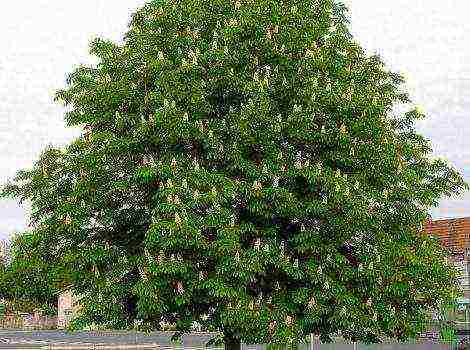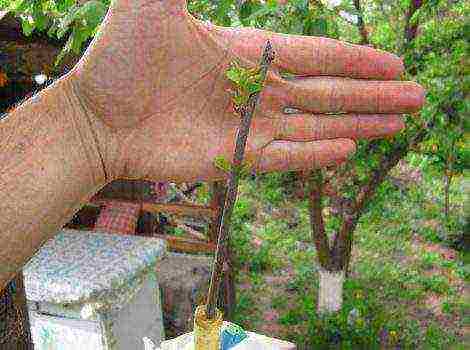Content
- 1 How to grow a lemon from a seed at home
- 1.1 Is it possible to grow a lemon from a seed at home?
- 1.2 Suitable variety for a house or apartment: Pavlovsky, Meyer and others
- 1.3 How to plant plant seeds: highlights
- 1.4 Will the indoor lemon tree bear fruit?
- 1.5 Optimal growing conditions, care after planting
- 1.6 Courting and Protecting: The Main Enemies of Citrus
How to grow a lemon from a seed at home
Lemon - a tree of the genus Citrus, everyone knows its fruit. The homeland of this plant is China, India and the Pacific tropical islands.
Lemon was first introduced by the Arabs to the Middle East, North Africa, Spain and Italy.
Is it possible to grow a lemon from a seed at home?
People know about the benefits of lemon firsthand. Lemon is an excellent remedy for many ailments... It strengthens the immune system, normalizes hormones, improves vision, and stimulates the digestive tract.
It is used for colds, as it contains a huge amount of vitamin C and many people just like the sour, aromatic taste.
To a man who decided to plant a lemon at home, it is important to consider the following rules:
- the fruit should be yellow, the most ripe, since if the lemon is green, then due to the fact that it is not ripe, the germs of sprouts in the seeds of such a lemon may not sprout;
- for planting, it is important to choose several large seeds - from 10 to 15 pieces, so that later you can choose a beautiful and actively growing seedling;
- it is important to choose a suitable variety that will grow well at home.
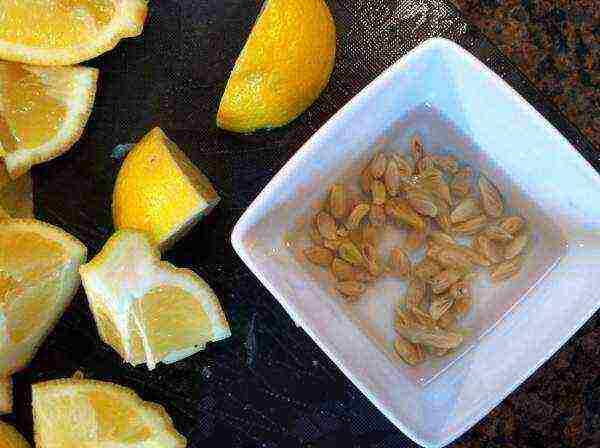
Suitable variety for a house or apartment: Pavlovsky, Meyer and others
There are many varieties. Below are some of them that are suitable for growing in a house or apartment:
- Pavlovsky - differs from other varieties in its large fruits, which can reach 500 grams, has a sweetish taste, and the tree of this variety is quite large - more than 2 meters. This variety is distinguished by fragrant leaves. The scent is so sharp and strong that the whole house will be filled with it.
- Meyer - a hybrid of lemon with grapefruit, has a sweet and sour taste, a small tree with a rich harvest, the size of one lemon can reach 150 grams, blooms in bunches, there is a seasonal dormant period.
- Ponderosa - a hybrid of lemon with grapefruit, has a bitter taste, as well as the presence of a large number of seeds. Pleases that it constantly blooms. According to the people who grow this type of lemon, it is a very grateful plant and very unpretentious.
- Genoa - an average tree, gives a large yield already for 4-5 years of life. Fruits with delicate pulp, have a sour, aromatic taste. You can also eat the rind. This variety is considered not whimsical. For 2-3 years, the seedling is already blooming.
- Anniversary - a medium-sized tree, considered a variety that gives a rich harvest, the fruit is distinguished by its thick skin. Very suitable for growing in a house or apartment.
After the stage of choosing a variety has been passed, it is necessary to proceed to the very planting of the seeds in the pot.
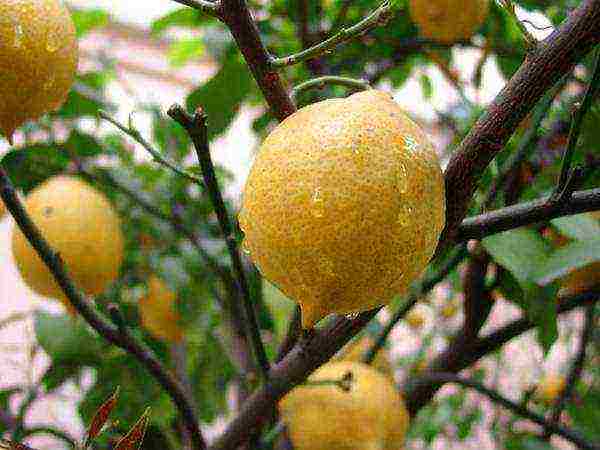
How to plant plant seeds: highlights
Some active citrus growers with a wealth of experience it is advised to free the bone from the upper husk, which in their opinion allows you to get seedlings in the shortest possible time.
This must be done very carefully, since any damage to the seed can lead to the fact that the germination of the seed does not occur.
But you can plant bones without the above procedure.
Lemon seeds must be wet before planting... It is advisable to soak them for a day in water or in a solution of sodium humate. You can buy this growth stimulant at any botanical store.
Next, you need to find a suitable small, shallow pot or glass, pour earth into it. There should be holes in the bottom of the pots... They are important so that excess moisture, due to which the roots of the sprouts may die, flows down.
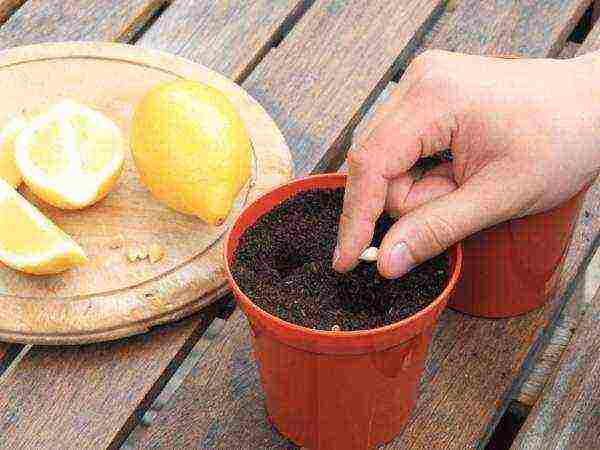
Put 1.5-2 cm of expanded clay, small pebbles or very coarse sand on the bottom of the pot. Planting soil can be purchased at the store, but you can prepare yourself. To do this, you need to mix garden soil, sand, humus and a little charcoal.
It is better to plant bones to a depth of no more than 1.5-2 cm... It is important to moisten the soil before planting. It should not be dry, but excessive moisture is also undesirable.
Spray the soil once every 2-3 days... If the ground has become completely dry, then you can water it a little. After the first shoots appear, the film must be removed.
It is better to rearrange the pot with sprouts in a bright place and water with settled or rain water, at room temperature.
The first shoots will sprout no earlier than 3-4 weeks after planting.
According to experienced citrus growers, the best time to plant lemon is late winter, early spring... Since the increasing daylight hours will only benefit the young sprouts that have appeared.
Will the indoor lemon tree bear fruit?
Many people think that growing a lemon from a seed is a thankless job. Since it will take 5, 7, or even all 15 years to wait for fruits from such a lemon, and its fruits will be small in size.
For that, in order not to wait for decades when the lemon tree begins to bear fruit, it must be grafted... This can be done in two ways during the warm season (summer or warm spring):
- Into the cleft - the preferred type of grafting. It is necessary to take a stalk of a cultivated fruiting lemon. A branch is cut on the seedling, and the remaining stem of the seedling is split. A "wedge" is sharpened on the cutting of a fruiting lemon, which is then introduced into the split in the stem. Next, you need to tie the vaccine with electrical tape. 2-4 buds are left on the cutting of a fruiting lemon, everything else is cut off. The inoculation is covered with a plastic bag. When the vaccine has healed, the bag can be removed.
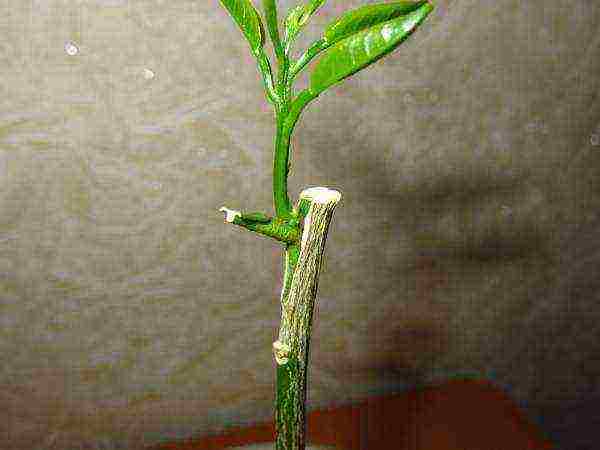
- Oculated - the shoots are cut off from the seedling, a "stump" 10 cm high remains from the tree. Next, they take a sprig of cultivated fruit-bearing lemon. Under each leaf of the twig is the so-called "dormant bud". A slice must be made in front of this kidney. Next, cut off the leaf plate, but leave its petiole. Cut the bark on the "stump" of the seedling and insert the petiole with the cut down. Tie the vaccination site with electrical tape. The stalk of the cut leaf plate will serve as an indicator. If the petiole falls off after 2-3 days, then we can assume that the vaccination was successful, but if it dries up, then the vaccination has failed and must be repeated.
I wonder what grown lemon from seed adapts to home conditions faster and better, it is less picky than grafted and grafted seedlings.
Why lemon grown from seed does not bear fruit:
Optimal growing conditions, care after planting
It is advisable to be very attentive to a lemon that has risen in a pot. When on lemon seedlings 3-4 leaves will appear, they are transplanted into separate pots.
It is recommended to replant young lemon trees up to 2 times a year. It is advisable to do this very carefully so as not to damage the root system.
And the best solution would be not to change the place of "residence" of the lemon. The best place for a lemon would be the south or southwest side of the apartment. In terms of temperature, lemon can tolerate temperatures from + 14 ℃ to + 27 ℃.

Lemon create conditions without sudden temperature jumpssince they can kill him. It is desirable to maintain a moderate air humidity of 60-70%.
Water the plant best with rainwater at room temperature. In hot summer, it is better to do this 2 times a day. And on cloudy and cold days, it is important to add lighting to lemon with LED or fluorescent lamps.
Feed in the summer a seedling can be a solution of humus and liquid mineral fertilizers.
Lemons, like all houseplants susceptible to disease and pest attacks... Therefore, they need careful care, and it is also recommended to carefully examine the plant every day in order to detect the appearance of this or that pest as early as possible and take the necessary measures in time.
Courting and Protecting: The Main Enemies of Citrus
Lemon gets sick if you do not follow the rules of care. If the tree is watered a little, it will dry out. If the soil in the pot is oversaturated with moisture, then yellow leaves will appear on the lemon, and this will be a sign that the roots of the tree are beginning to rot.
Same the appearance of yellow spots on the foliage, after which the leaves dry and fall off, indicate that the wood lacks iron.
Drying leaf ends say that the tree needs phosphorus. And the lack of potassium and manganese leads to wrinkling of the leaves and falling off of the ovary.
Below are some common parasites that can attack a home-grown lemon:
- Mealybugs, popularly known as "hairy lice" - on a tree they can be recognized by a white bloom. They prefer dry conditions, they are afraid of moisture. A good prevention of this parasite is to regularly rinse all the lemon leaves.
- Shield - small shiny droplets appear on the leaves, sticky to the touch. Leaves dry and fall off. Soapy or garlic water is used against this pest. Soap water is prepared as follows: 2 tablespoons of liquid soap are dissolved in 1 liter of water. The resulting mixture is treated with the affected tree. An hour after the procedure, they are washed under the shower. It is desirable to repeat the treatment after 2 days.
- Spider mite - small, light dots on the sheet plate. The leaves are curling up. A cobweb is visualized on their back. If this parasite is found on the lemon, it is necessary to treat the tree with sulfur. For prevention purposes, the lemon is washed under running water, paying more attention to the underside of the leaf plates of the tree. Spraying with a solution of water and laundry soap helps to fight the mite well.
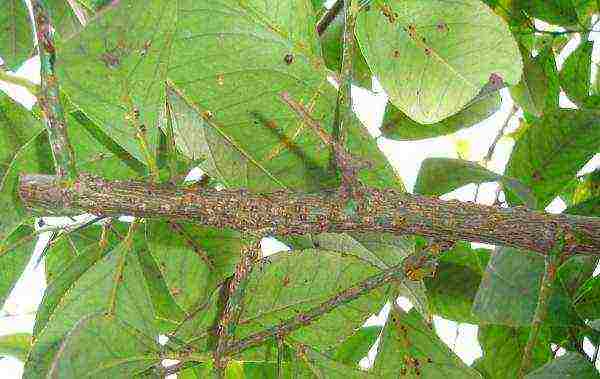
Prevention measures
There are several simple preventive measures that will prevent the attack of parasites or damage to the tree by diseases:
- give a lemon tree a hot shower... The plant will not suffer from this, and unnoticed parasites will be neutralized and washed away;
- spray the leaves (especially from the bottom side);
- wipe the lemon leaves once a week with soapy water (it is better to use laundry soap).
The lemon tree is not geranium, it needs proper care and it is very difficult for a beginner to figure out what, how and when to do it.
With the effort and study of the rules for caring for lemon, you can get a pleasant result. Home-grown lemon will delight not only with its aroma, but also with delicious fruits.
Growing lemon from seed:
